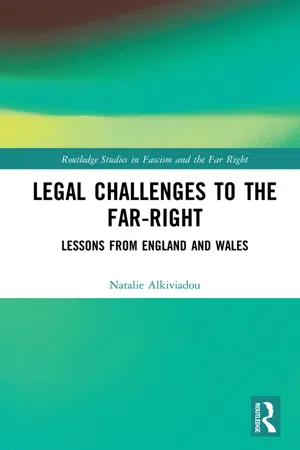General introduction
Following World War II, the international community said never again to fascism and aggressive nationalism through documents such as the Universal Declaration of Human Rights. Over time, the European project has grown into one of enhanced integration with Article 2 of the Treaty on European Union, setting out foundational values to include, inter alia, equality, human rights, democracy and the rule of law. Nevertheless, the UK has voted to leave the EU and post-Brexit Britain has been witnessing a worrying rise in hate as extrapolated on further on in this chapter. These developments have not been isolated to the UK but, rather, coincide with a global trend as manifested in, inter alia, the EU election results of 2019, which saw victories for parties such as the National Front of France and Lega of Italy, the violent and hateful rampage of Golden Dawn of Greece, before the State crackdown in 2013 and its final ousting from parliament in the 2019 general elections and the deterioration of the rule of law by the Hungarian and Polish governments.
In terms of the meaning of far-right, it is beyond the scope of this book to delve into a deep analysis of this term. In fact, the far-right is not easily defined, and terms such as ‘populist, neo-nationalist, far-right, radical right and extreme right are often used interchangeably’.2 For purposes of the subsequent analysis, the far-right is taken to cover political parties, non-party groups and the subculture milieu which embrace exclusionary politics and/or actions and/or rhetoric which seek to polarise, in a violent and/or non-violent manner, members of society which the far-right perceives as disruptive for social cohesion. These include immigrants and/or ethnic minorities and/or religious minorities and/or LGBT persons and/or disabled persons. In extension to the definitional clarification of the far-right, it must also be noted from the onset that, in some parts of the book, for example when referring to international and European obligations, reference will be made to the UK rather than to England and Wales, due to the fact that, in such spheres, unlike in relation to the legal system, the UK is one entity.
Approach, contribution and structure
Literature, to date, has looked at certain angles of the far-right in the UK, predominantly through spheres such as political science, political history, sociology and gender studies. For example, The Post-War Anglo-American Far Right: A Special Relationship of Hate3 considers the history of the far-right in the USA and the UK. Gender and Far-Right Politics in Europe4 includes a chapter discussing the question of how gender is tied in with the far-right in the UK. Stopping the Far Right: How Progressive Politics Can Tackle Political Extremism5 looks at the British National Party (BNP) and considers the role of the Labour Party at the forefront of tackling racism. It is published by the Young Fabians, a left-wing think tank run by young people. There are certain books which look at particular entities, such as Bloody Nasty People: The Rise of Britain’s Far-Right,6 which evaluates the history and development of the far-right in Britain through investigative journalism and empirical studies. Revolt on the Right: Explaining Support for the Radical Right in Britain7 assesses the United Kingdom Independence Party (UKIP), its history, content, vision and the manner in which it became the most significant new party in recent British politics.8 In terms of legal research, Hate Speech Revisited: A Comparative and Historical Perspective on Hate Speech Law in the Netherlands and England & Wales9 examines a particular element of the far-right in England and Wales, namely, hate speech. There has been no study to date looking at the legal sphere of challenging the far-right, as manifested by political parties, non-party groups and subculture movements in England and Wales.10 Thus, this book contributes to filling the void of assessing the available law in English law which can be used to challenge the far-right.
The analysis will be effectuated against the backdrop of a contextual framework which will set out the legal culture of England and Wales and, in particular, its common law system, discussing the unity of England and Wales as one legal system. Based on this, it will explain why the book is studying England and Wales and not the UK as a whole. Given the developments following the referendum of 23 June 2016, in which 52% of the British people opted to exit the European Union, there will also be a discussion on the impact of the referendum on the legal and political culture of the United Kingdom as well as the link between the results and the rise in hate crime and hate speech in the country. A backdrop will then be given of the triggering factors exploited by far-right entities in England and Wales and a closer look taken at the entities which make up this scene. More particularly, the section will consider far-right political parties, non-party movements and the subculture milieu, taking care to distinguish between violent, non-violent and quasi-violent mandates. After the contextual setting has been established, the book will provide an overview of the definitional framework of key terms including, but not limited to, terrorism, racist speech, racial hatred and religious hatred, emanating from the legal and policy frameworks of England and Wales. Against the aforementioned contextual setting, the book will lo...
